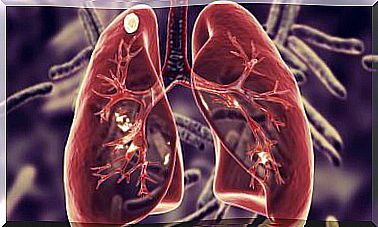5 Imminent Signs Of A Possible Appendicitis
Appendicitis is a condition that occurs when the appendix, a small pouch that is connected to the large intestine, becomes inflamed. It is one of the most common reasons for hospitalization.
The main function of the appendix is to host and protect the bacteria that promote the proper functioning of the colon. This inflammation generally occurs when the appendix becomes obstructed by a foreign body or fecal matter, resulting in an overpopulation of bacteria.
This condition can manifest itself at any stage of our life. Although it is more common between 10 and 35 years of age.
The symptoms of appendicitis are usually very varied, so it is not always easy to establish its diagnosis. Above all, when it occurs in children and the elderly where these signs are often confused with other disorders typical of those ages.
5 impending signs of possible appendicitis

Keep in mind that not paying attention to this condition in time can cause the appendix to burst. Or that causes an infection within the abdomen, known as peritonitis. Therefore, it is vitally important to recognize the signs of possible appendicitis.
Here are the signs that you should pay special attention to.
1. Acute abdominal pain
The first sign to consider appendicitis is a sharp pain around the belly button. It can be mild at the beginning and gradually increase until it becomes unbearable.
This pain usually travels to the lower right part of the abdomen. It can also be made worse by coughing, walking, or making sudden movements.
There are rare cases where the pain occurs on the left side of the abdomen. This generally occurs when the appendix is longer than usual and extends radiating greater intensity of discomfort towards that area.
2. Nausea, vomiting and fever
A few hours after the onset of acute abdominal pain, nausea, vomiting and, in some cases, even fever often occur. At that point, one can begin to suspect that it is indeed an ongoing appendicitis.
3. Constipation or diarrhea

Generally appendicitis presents with diarrhea, constipation and rectal urgency. All these stomach problems added to the previous ones are usually the most certain signs that your appendix is coping with a chronic condition.
4. Symptoms do not stop over time
The affected person may notice that the pain does not go away with the passage of time, even when it has rested. On the contrary, you may feel that the condition worsens, making it very difficult to stand up and even walk.
5. Sensitivity to touch
If the pain you suffer is intensified just by touching the affected area or if pressing on the lower right part of the abdomen and then releasing the pain increases, it is almost certainly appendicitis. It is therefore advisable to consult a health professional as soon as possible.
recommendations
While you go to the doctor to confirm the diagnosis, it is very important to avoid treating the symptoms at home, therefore:
- Avoid ingesting laxatives.
- Skip the use of hot compresses.
- Do not eat or drink anything until you are examined.
- Avoid self-medication and the consumption of natural remedies, as they could be counterproductive.
Prevention is also a factor to consider. Eating a diet rich in fiber facilitates digestive processes and reduces the chances of suffering from appendicitis. Include fruits and vegetables in your meals, whole grains, and make sure you consume enough water throughout the day to stay well hydrated.
It is important to note that not all people who suffer from appendicitis present these signs (some only report feeling a general discomfort), but if you experience several of them, you should definitely see your doctor.








